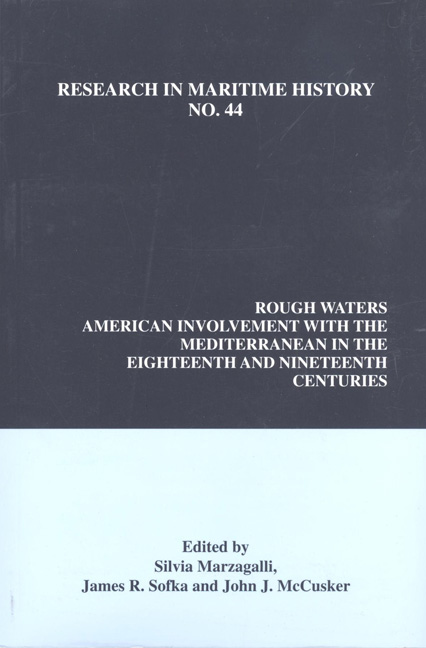Book contents
- Frontmatter
- Contents
- About the Editors
- Contributors' Notes
- “Rough Waters: American Involvement in the Mediterranean in the Eighteenth and Nineteenth Centuries: An Introduction”
- “Worth a War? The Importance of the Trade between British America and the Mediterranean”
- “Relations between North America and the Italian Peninsula, 1763-1799: Tuscany, Genoa and Naples”
- “American Shipping into the Mediterranean during the French Wars: A First Approach”
- “Notes toward a Franco-American Mediterranean 'From Below'”
- “Consuls and Consiglieri: United States Relations with the Italian States, 1790-1815”
- “Old and New Republics: Diplomatic Relations between the Republic of Genoa and the United States of America”
- ‘“From the Halls of Montesuma, to the Shores of Tripoli:’ Antoine Zuchet and the First Barbary War, 1801-1805”
- “Minorca: The First United States Naval Base in the Mediterranean and the American Consulate at Port Mahon”
- “‘The Jeffersonian Idea of National Security’ Revisited”
- “The Reluctant Warrior: Thomas Jefferson and the Tripolitan War, 1801-1805”
- “Slavery as Social Mobility? Western Slaves in Late Eighteenth Century Algiers”
- “Americans in the Mediterranean in the Late Eighteenth and Early Nineteenth Centuries: Concluding Remarks”
‘“From the Halls of Montesuma, to the Shores of Tripoli:’ Antoine Zuchet and the First Barbary War, 1801-1805”
- Frontmatter
- Contents
- About the Editors
- Contributors' Notes
- “Rough Waters: American Involvement in the Mediterranean in the Eighteenth and Nineteenth Centuries: An Introduction”
- “Worth a War? The Importance of the Trade between British America and the Mediterranean”
- “Relations between North America and the Italian Peninsula, 1763-1799: Tuscany, Genoa and Naples”
- “American Shipping into the Mediterranean during the French Wars: A First Approach”
- “Notes toward a Franco-American Mediterranean 'From Below'”
- “Consuls and Consiglieri: United States Relations with the Italian States, 1790-1815”
- “Old and New Republics: Diplomatic Relations between the Republic of Genoa and the United States of America”
- ‘“From the Halls of Montesuma, to the Shores of Tripoli:’ Antoine Zuchet and the First Barbary War, 1801-1805”
- “Minorca: The First United States Naval Base in the Mediterranean and the American Consulate at Port Mahon”
- “‘The Jeffersonian Idea of National Security’ Revisited”
- “The Reluctant Warrior: Thomas Jefferson and the Tripolitan War, 1801-1805”
- “Slavery as Social Mobility? Western Slaves in Late Eighteenth Century Algiers”
- “Americans in the Mediterranean in the Late Eighteenth and Early Nineteenth Centuries: Concluding Remarks”
Summary
Around 1800 Dutch relations with the Barbary States were generally rather cordial. For instance, the Netherlands had renewed its treaty with Algiers in 1794. Since the 1790s the Dutch Republic had representatives in Tripoli; J.G. Kaupe was first vice-consul, and later consul, between 1796 and 1803. Under his guidance the Treaty of 1728 was renewed in 1802. The Dutch Republic agreed to pay Bashaw Yusef 80,000 piastres fortes (piaster or peso). The first 20,000 would be transferred by bill of exchange; the other 60,000 would be shipped from the Netherlands in March of the following year. Furthermore, the Dutch would pay the Bashaw 5000 piastres annually. In return, Dutch mariners would be safeguarded from captivity by the Bashaw's subjects. Kaupe left Tripoli early in 1803. He was replaced by chargé d'affaires Antoine Zuchet, an Italian from Livorno who was living in Tripoli. In his corrupted French, Zuchet regularly informed his superiors about affairs in Tripoli. Because no Dutch ships entered Tripoli, Zuchet usually used Maltese vessels to send these letters to the Ministry of Foreign Affairs in The Hague. Although Zuchet did not speak Arabic, he was well connected and wrote regularly about the Bashaw's court. His correspondence provides, among other things, a detailed account of the war between the United States and Tripoli. This essay will provide an English-speaking audience access to his unpublished account.
Tripoli was nominally under the suzerainty of the Ottoman Empire and was known as a “Regency,” but in practice it was an independent city state. The Turkish Karamanli family ruled Tripoli from 1711 to 1835. Ahmed Karamanli became caïd (chief) of the city and managed to exploit the unstable conditions to expel the Ottoman rulers in 1711 and to establish effective control over Tripoli. In 1722 the Ottoman government confirmed him as Bashaw (a man of high rank or office). Ahmed eventually extended his rule over the regions of Fezzan and Cyrenaica and increased privateering activities. This brought him into contact with the European maritime powers, which were usually willing to buy him off by paying tribute. He ruled until 1745.
Ahmed's son and grandson ruthlessly suppressed all opposition and were also accorded recognition by the Ottomans. During the last years of the eighteenth century, however, internal quarrels paved the way for a temporary restoration of Ottoman rule under Ali Burghal.
- Type
- Chapter
- Information
- Rough WatersAmerican Involvement with the Mediterranean in the Eighteenth and Nineteenth Centuries, pp. 117 - 134Publisher: Liverpool University PressPrint publication year: 2010

